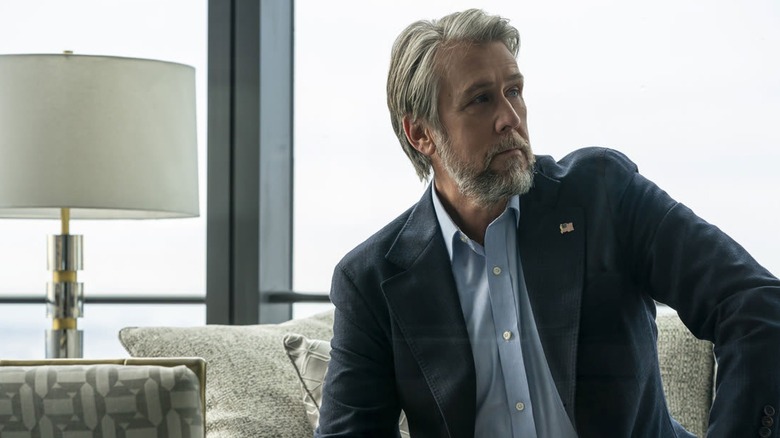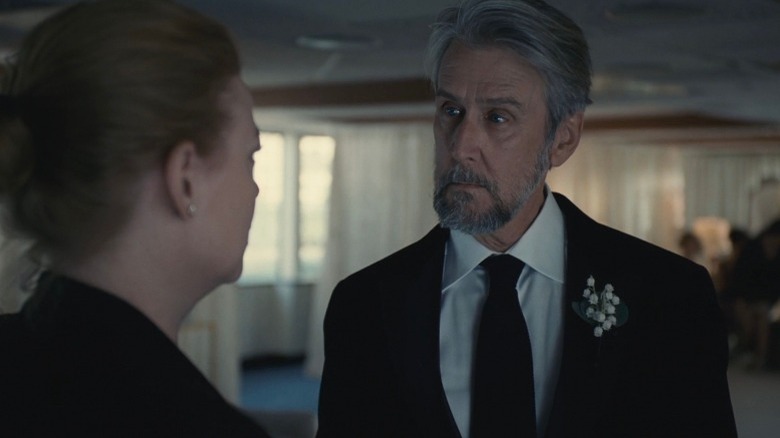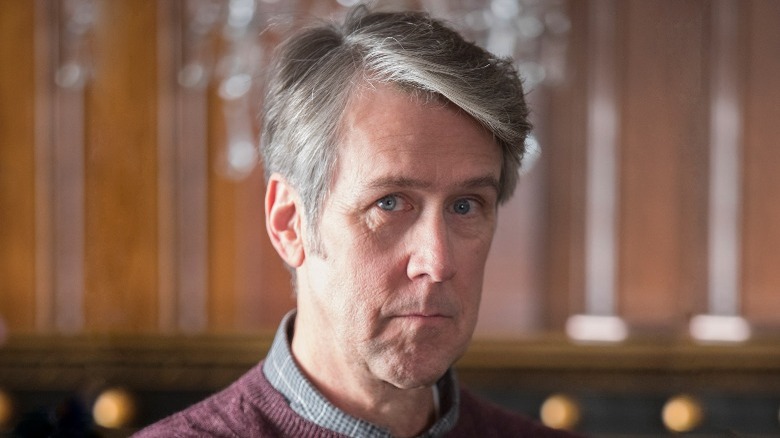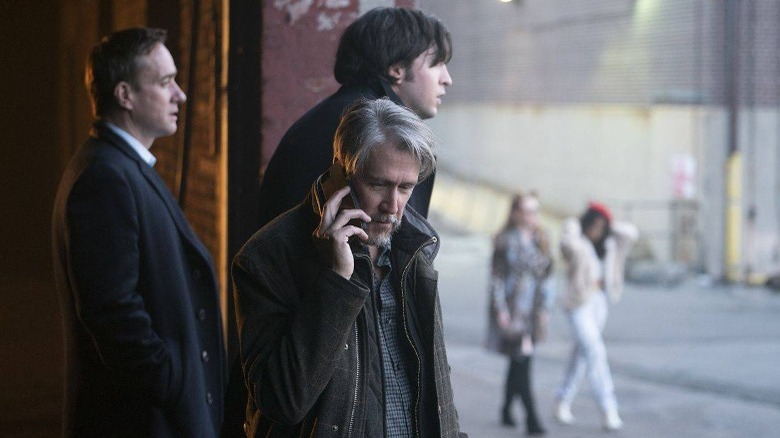Succession's Alan Ruck Auditioned For Connor Without Having Read A Single Script
With the HBO media empire tragicomedy "Succession," the damaged and destructive adult children of billionaire mogul Logan Roy (Brian Cox) take center stage. For every shareholder meeting or tense bit of boardroom drama, the show spends much more time digging into the cyclical journeys of self-discovery or delusion that the children undergo. And none of them, not even megalomaniacal "#1 Boy" Kendall (Jeremy Strong), are as delusional as eldest son Connor (Alan Ruck).
If Alan Ruck's performance as Connor reflects anything, it's that against all odds he will find a way to dominate a given episode or storyline. For a character with a small role at the series' outset, he's become something of a fan favorite, whether it's rightfully fighting for his share of the pie as "the eldest son" or his Leonard Cohen karaoke choice. His romantic relationship and eventual marriage with former escort Willa (Justine Lupe) is as unsettling as it is surprisingly warm, and even when he was only polling 1% in the show's presidential election storyline, fans (in-universe, they are called "Con-heads") hoped he could pull through.
It's hard to imagine anybody but Ruck bringing Connor's delusions and pitiable sweetness to life, getting the heart-wrenching emotion and incredible humor at the core of the character. If the show lucked out with him getting the part, he did as well — his audition process was unique and spontaneous, one that ensured he would be a good fit with the show's similar shooting style. In a recent interview with the New York Times, Ruck said he auditioned without ever having read a script, in the home of executive producer Adam McKay.
Not like the other siblings
Prior to his fateful audition for the role, Alan Ruck hadn't read the script. But his sharp wit and immediate sense of what the character was about made it clear to executive producer and pilot director Adam McKay he would have what it takes.
While Connor Roy would go on to be one of the show's most iconic portrayals of stunted adulthood, that wasn't necessarily part of showrunner Jesse Armstrong's original creative vision. Much of Connor's characterization came directly from Alan Ruck's early work in the show, which fleshed him out mightily.
Even before his abortive and compromised run for President began late in the show's first season, Connor shared none of his siblings' fire or killer instincts. As the sole child of Logan's first marriage, he grew up somewhat less insulated by wealth. His soft demeanor, obsession with Napoleon, and Thoreau-esque ideology (complete with a ranch in the Southwest, named after a Napoleonic battle) mark him as fundamentally different from the others. Any time he gets greedy or craven, he lacks the chops to pull it off.
Because of this, Connor is not quite afforded the same degree of dramatic significance as his siblings. Never a serious player for the succession promised by the series title, his storylines tend to focus on his delusions of political grandeur (arising most famously in his ill-advised eulogy for a sexual predator family friend). Some episodes reduce him to a single line or two on the margins of the primary story, but even then, one thing is consistent: they're the funniest lines of the episode.
Before he was Connor
If Alan Ruck was most famous for his role as Cameron in the '80s John Hughes classic, "Ferris Bueller's Day Off," his time on "Succession" has certainly changed that. But in the 30 years between those projects, Ruck was simply a working actor, surviving lean years and feasting in prosperous ones. Some sitcoms like 1990's "Going Places" lasted just one season before getting canceled, and others like "Spin City" lasted for six years, giving Ruck the chance to finetune his comedic muscles.
By 2016, he had gotten a solid role on Fox's "The Exorcist," a horror drama based on the 1973 film. Production on that show's first season was based in Chicago, causing Ruck to be away from his Los Angeles-based family during the week and back on the weekends to spend time with his actor wife Mireille Enos and their kids. That vastly limited the amount of free time they had, which faced additional strain when Ruck was notified of a particular project by his agent: a new HBO drama that was currently casting. The only problem was that Ruck was double-booked — he'd already planned on attending a music class with his family.
According to the New York Times, Enos was upset at the news, even bursting "into tears" per Ruck. So he skipped the audition for the sake of the family music class but made time to drop by executive producer Adam McKay's house shortly after, even though he wouldn't be able to adequately prepare.
The improv factor
As it turned out, he didn't need to. What Alan Ruck brought to the de facto audition at Adam McKay's house showed that he understood the character and could make it his own. In fact, his not having read the script in advance meant that he had to improvise, a skill that would become foundational on the "Succession" set. In a show where the actors are often free to play around with the language scripted by creator Jesse Armstrong and his writers, sometimes to the point of effectively adding whole storylines, that's very important.
The improvisational nature of the show began with McKay's auditioning process, but became a key part of the show's production. As Jeremy Strong told GQ, it "opens up the environment in a way where you have permission to wander off the path a little bit." While the show doesn't typically go entirely off-script, it does employ what executive producer and frequent director Mark Mylod calls "freebies," according to the New York Times. After getting solid coverage of the script as written, freebies let the actors play around a lot more.
Ruck is always extremely complimentary towards the show's creative team, telling "Ferris Bueller" co-star Matthew Broderick in Interview Magazine that the writers are "a dream team." But it goes both ways. As Mylod told the New York Times, Ruck could have "a freebie and basically run a 10-minute roll of film without ever breaking character."



